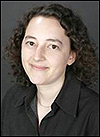Sharon Weiss, assistant professor of electrical engineering, has been accepted into the 2012-2013 class of the Defense Science Study Group (DSSG).
The DSSG is a program of education and study that introduces selected scientists and engineering professors to the challenges facing national security and encourages them to apply their talents to these issues either as government advisers or in their own research.
Group members interact with top-level officials from the Defense Department, other government organizations such as the Department of Homeland Security, various intelligence agencies, and Congress. The program is directed by the Institute for Defense Analyses (IDA) and is sponsored by the Defense Advanced Research Projects Agency (DARPA).

Weiss’ research in nanoscale biosensing focuses on the accurate and reliable detection of biological and chemical materials that is essential for improved medical diagnostics, environmental monitoring and homeland security. Her lab creates sensors made from porous silicon, a material with billions of tiny nanometer-sized holes (1,000 times smaller than the thickness of a human hair). By evaluating how light interacts with the porous silicon, it is possible to detect the presence of trace amounts of biological material.
Each study group meets for two years, divided into two week-long sessions during the summer and two three-day sessions during the academic year. During these eight sessions, members focus on defense policy, related research and development, and the systems, missions, and operations of the armed forces and the intelligence community.
Integral to the program are studies written by DSSG members, either individually or in small groups, on national security issues of their choice. These “think pieces” allow members to personalize the DSSG experience, to focus on a particular area of importance to DoD, to bring their knowledge from an academic environment to bear on issues of concern, and to interact with individuals in DoD with related interests.
Weiss won a National Science Foundation CAREER award in 2008, providing her with $400,000 in research funding over five years. In 2009 Weiss was among 100 researchers named by President Obama as a winner of a Presidential Early Career Award for Scientists and Engineers (PECASE). She also was awarded a Young Investigator Program award from the Army Research Office in 2009.